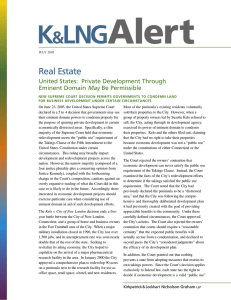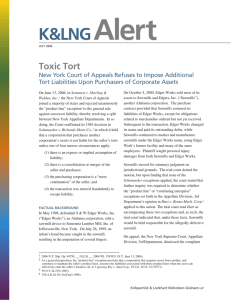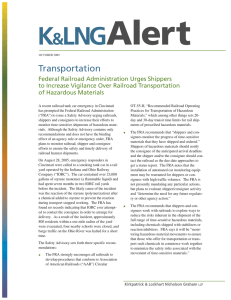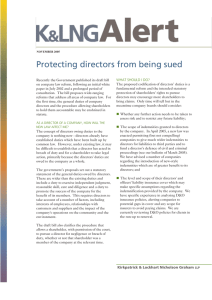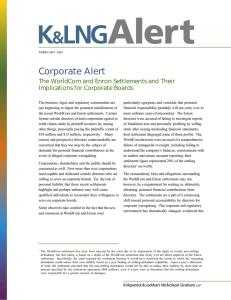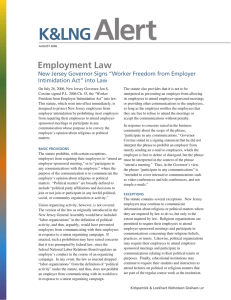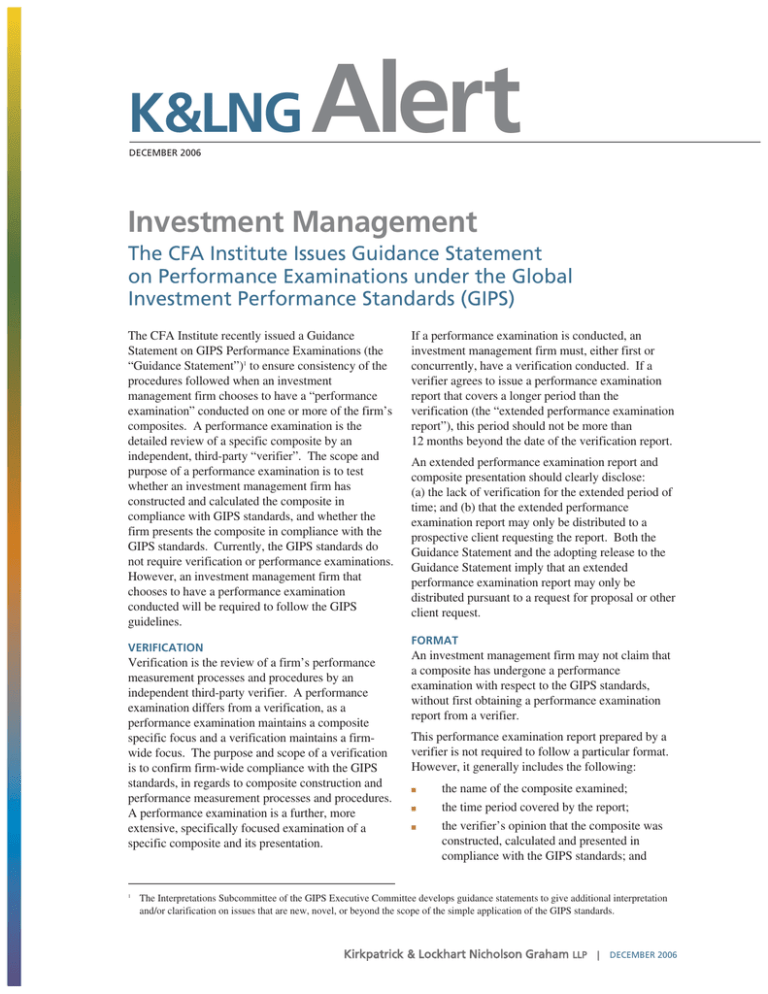
K&LNG
DECEMBER 2006
Alert
Investment Management
The CFA Institute Issues Guidance Statement
on Performance Examinations under the Global
Investment Performance Standards (GIPS)
The CFA Institute recently issued a Guidance
Statement on GIPS Performance Examinations (the
“Guidance Statement”)1 to ensure consistency of the
procedures followed when an investment
management firm chooses to have a “performance
examination” conducted on one or more of the firm’s
composites. A performance examination is the
detailed review of a specific composite by an
independent, third-party “verifier”. The scope and
purpose of a performance examination is to test
whether an investment management firm has
constructed and calculated the composite in
compliance with GIPS standards, and whether the
firm presents the composite in compliance with the
GIPS standards. Currently, the GIPS standards do
not require verification or performance examinations.
However, an investment management firm that
chooses to have a performance examination
conducted will be required to follow the GIPS
guidelines.
An extended performance examination report and
composite presentation should clearly disclose:
(a) the lack of verification for the extended period of
time; and (b) that the extended performance
examination report may only be distributed to a
prospective client requesting the report. Both the
Guidance Statement and the adopting release to the
Guidance Statement imply that an extended
performance examination report may only be
distributed pursuant to a request for proposal or other
client request.
FORMAT
VERIFICATION
Verification is the review of a firm’s performance
measurement processes and procedures by an
independent third-party verifier. A performance
examination differs from a verification, as a
performance examination maintains a composite
specific focus and a verification maintains a firmwide focus. The purpose and scope of a verification
is to confirm firm-wide compliance with the GIPS
standards, in regards to composite construction and
performance measurement processes and procedures.
A performance examination is a further, more
extensive, specifically focused examination of a
specific composite and its presentation.
1
If a performance examination is conducted, an
investment management firm must, either first or
concurrently, have a verification conducted. If a
verifier agrees to issue a performance examination
report that covers a longer period than the
verification (the “extended performance examination
report”), this period should not be more than
12 months beyond the date of the verification report.
An investment management firm may not claim that
a composite has undergone a performance
examination with respect to the GIPS standards,
without first obtaining a performance examination
report from a verifier.
This performance examination report prepared by a
verifier is not required to follow a particular format.
However, it generally includes the following:
■
■
■
the name of the composite examined;
the time period covered by the report;
the verifier’s opinion that the composite was
constructed, calculated and presented in
compliance with the GIPS standards; and
The Interpretations Subcommittee of the GIPS Executive Committee develops guidance statements to give additional interpretation
and/or clarification on issues that are new, novel, or beyond the scope of the simple application of the GIPS standards.
Kirkpatrick & Lockhart Nicholson Graham LLP |
DECEMBER 2006
information that the report is for a performance
examination and conducted by the verifier in
accordance with the Guidance Statement.
If a verifier concludes that the composite presentation
does not satisfy the GIPS standards, the verifier must
issue a statement to the investment management firm
clarifying the reason(s) why it was not possible to
provide a performance examination report.
—
■
REQUIRED PROCEDURES
Verifiers must comply with certain procedures when
issuing a performance examination report. The
following is a highlight of these procedures:
■
■
■
Pre-Performance Examination Procedures.
A verifier that did not perform the firm-wide
verification must have knowledge of the firm,
the GIPS standards, the applicable countryspecific laws and regulations and the investment
management firm’s policies used for the
composite when establishing and maintaining
compliance during the period examined.2
Sample Portfolio Selection. A verifier may
check compliance with the GIPS standards by
using a selected sample of the composite’s
portfolios. The verifier conducting the
performance examination must determine the
appropriate sample size, and reasonableness of
the sample selected.
Performance Examination Procedures.
A verifier should examine:
— Cash flows, Income and Expenses, and
Portfolio Trade Processing to determine
whether each is recorded in the proper
portfolios, at the correct amounts, and on
a timely basis that is consistent with
established policies. Procedures should
be considered and performed at a level
that satisfies the verifier that each of the
above items is supported by
documentation and the methods used to
account for each item are appropriately
and consistently applied.
— Portfolio Valuation to determine whether
the beginning- and end-of-performance
measurements period valuations of
security positions are valued correctly
and on the correct dates.
■
■
Performance Measurement Calculation
to determine that portfolio and composite
returns have been correctly calculated.
— Composite Presentation Information and
Disclosures to determine whether the
presentation includes all the information
and disclosures required by the GIPS
standards. Investment management
firms must determine that the
presentation also complies with
applicable regulatory requirements.
Maintenance of Records. A verifier must
maintain sufficient information to support the
performance examination report.
Management Representation Letter. The
verifier must obtain a representation letter from
the firm confirming that the composite being
examined is in compliance with the GIPS
standards, in relation to the following areas:
(1) the composite construction; (2) the
composite calculations; and (3) the composite
presentation and preparation. This letter
should also confirm any other specific
representations made to the verifier during the
examination.3
CONCLUSION
The Guidance Statement on GIPS Performance
Examinations can be found on the CFA Institute
website at www.cfainstitute.org/centre. The
Guidance Statement includes a sample report that is
compliant with the Guidance Statement provisions.
Firms that engage in a performance examination of a
specific composite that covers performance for
periods ended December 31, 2006 must apply the
new Guidance Statement. The Guidance Statement
requires no retroactive application.
Michael S. Caccese*
617.261.3133
mcaccese@klng.com
Amber D. Baker
617.951.9076
amber.baker@klng.com
2
A firm that performed a firm-wide verification is already required to meet this requirement.
3
The investment management firm is responsible for fully disclosing any information to the verifier that might affect the work of the
verifier performing the performance examination.
*
Michael Caccese is a partner in the Boston office of Kirkpatrick & Lockhart Nicholson Graham LLP. He works extensively with
investment firms on compliance issues, including all of the CFA Institute standards. He previously was the General Counsel to
AIMR and was responsible for overseeing the development of AIMR-PPS, GIPS and other standards governing the investment management profession and investment firms. Amber D. Baker is an associate with K&LNG in the Boston office.
2
Kirkpatrick & Lockhart Nicholson Graham
LLP
|
DECEMBER 2006
If you have questions or would like more information about K&LNG’s Investment Management Practice, please contact
one of our lawyers listed below:
BOSTON
Joel D. Almquist
Michael S. Caccese
Mark P. Goshko
Thomas Hickey III
Nicholas S. Hodge
George Zornada
617.261.3104
617.261.3133
617.261.3163
617.261.3208
617.261.3210
617.261.3231
jalmquist@klng.com
mcaccese@klng.com
mgoshko@klng.com
thickey@klng.com
nhodge@klng.com
gzornada@klng.com
LONDON
Philip Morgan
+44.20.7360.8123 pmorgan@klng.com
LOS ANGELES
William P. Wade
310.552.5071 wwade@klng.com
NEW YORK
Robert J. Borzone, Jr.
Jeffrey M. Cole
Alan M. Hoffman
Bruce J. Kahne
Beth R. Kramer
Richard D. Marshall
Scott D. Newman
212.536.4029
212.536.4823
212.536.4841
212.536.4019
212.536.4024
212.536.3941
212.536.4054
rborzone@klng.com
jcole@klng.com
ahoffman@klng.com
bkahne@klng.com
bkramer@klng.com
rmarshall@klng.com
snewman@klng.com
SAN FRANCISCO
Elaine A. Lindenmayer 415.249.1042 elindenmayer@klng.com
David Mishel
415.249.1015 dmishel@klng.com
Mark D. Perlow
Richard M. Phillips
415.249.1070 mperlow@klng.com
415.249.1010 rphillips@klng.com
WASHINGTON
Clifford J. Alexander
Diane E. Ambler
Mark C. Amorosi
Catherine S. Bardsley
Arthur J. Brown
Arthur C. Delibert
Jennifer R. Gonzalez
Robert C. Hacker
Kathy Kresch Ingber
Michael J. King
Deborah A. Linn
Cary J. Meer
Dean E. Miller
R. Charles Miller
Charles R. Mills
R. Darrell Mounts
C. Dirk Peterson
David Pickle
Alan C. Porter
Theodore L. Press
Francine J. Rosenberger
Robert H. Rosenblum
William A. Schmidt
Lori L. Schneider
Lynn A. Schweinfurth
Donald W. Smith
Fatima S. Sulaiman
Martin D. Teckler
Roger S. Wise
Robert A. Wittie
Robert J. Zutz
202.778.9068
202.778.9886
202.778.9351
202.778.9289
202.778.9046
202.778.9042
202.778.9286
202.778.9016
202.778.9015
202.778.9214
202.778.9874
202.778.9107
202.778.9371
202.778.9372
202.778.9096
202.778.9298
202.778.9324
202.778.9887
202.778.9186
202.778.9025
calexander@klng.com
dambler@klng.com
mamorosi@klng.com
cbardsley@klng.com
abrown@klng.com
adelibert@klng.com
jgonzalez@klng.com
rhacker@klng.com
kingber@klng.com
mking@klng.com
dlinn@klng.com
cmeer@klng.com
dmiller@klng.com
cmiller@klng.com
cmills@klng.com
dmounts@klng.com
dpeterson@klng.com
dpickle@klng.com
aporter@klng.com
tpress@klng.com
202.778.9187
202.778.9464
202.778.9373
202.778.9305
202.778.9876
202.778.9079
202.778.9223
202.778.9890
202.778.9023
202.778.9066
202.778.9059
francine.rosenberger@klng.com
rrosenblum@klng.com
william.schmidt@klng.com
lschneider@klng.com
lschweinfurth@klng.com
dsmith@klng.com
fsulaiman@klng.com
mteckler@klng.com
rwise@klng.com
rwittie@klng.com
rzutz@klng.com
www.klng.com
BOSTON • DALLAS • HARRISBURG • LONDON • LOS ANGELES • MIAMI • NEWARK • NEW YORK • PALO ALTO • PITTSBURGH • SAN FRANCISCO • WASHINGTON
Kirkpatrick & Lockhart Nicholson Graham (K&LNG) has approximately 1,000 lawyers and represents entrepreneurs, growth and middle market companies, capital
markets participants, and leading FORTUNE 100 and FTSE 100 global corporations nationally and internationally.
K&LNG is a combination of two limited liability partnerships, each named Kirkpatrick & Lockhart Nicholson Graham LLP, one qualified in Delaware, U.S.A. and
practicing from offices in Boston, Dallas, Harrisburg, Los Angeles, Miami, Newark, New York, Palo Alto, Pittsburgh, San Francisco and Washington and one
incorporated in England practicing from the London office.
This publication/newsletter is for informational purposes and does not contain or convey legal advice. The information herein should not be used or relied upon in
regard to any particular facts or circumstances without first consulting a lawyer.
Data Protection Act 1988—We may contact you from time to time with information on Kirkpatrick & Lockhart Nicholson Graham LLP seminars and with our regular
newsletters, which may be of interest to you. We will not provide your details to any third parties. Please e-mail london@klng.com if you would prefer not to
receive this information.
IRS Circular 230 Notice:
To ensure compliance with requirements imposed by the IRS, we inform you that any U.S. federal tax advice contained in this communication (including any
attachments) is not intended or written to be used, and cannot be used, for the purpose of (1) avoiding penalties under the Internal Revenue Code or (2) promoting,
marketing, or recommending to another party any transaction or matter addressed herein.
© 2006 KIRKPATRICK & LOCKHART NICHOLSON GRAHAM LLP. ALL RIGHTS RESERVED.



